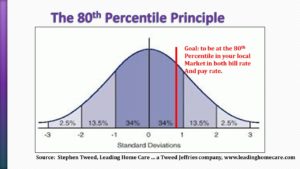By Stephen Tweed
A few years ago, my friend and professional speaking colleague, David Newman, wrote an article for professional speakers about why we should serve the top of our market. This fits perfectly with a conversation we were having in our Home Care CEO Mastermind Groups about clients, referral sources, minimum hours, prices and pay for caregivers.
Here are 17 things to consider in serving the Top of the Market:
- High fees are paid by clients and customers who are doing well, not those who are struggling
- Referrals come from those who are proud of the fees they pay you, not ashamed to be low-balling their way through business
- High-end clients tend to be believers – low-end clients tend to be skeptics
- Top clients are easier to please because they have a partner mind frame whereas low-end clients are almost impossible to please because they have a peddler mind frame
- Paying higher fees also means that your top-of-market clients pay you higher respect, pay your advice more attention, and invest more resources in their implementation of your ideas
- There is always a way to raise your game, boost your value prop, and charge higher fees. Otherwise, we wouldn’t have $500,000 sports cars or $35,000 watches
- There’s no profit in a business model that challenges other poverty-mindset entrepreneurs in a race to the bottom
- You can always design a “lower-level entry point” to a high-end offering (Example: the $125 Tiffany bracelet.) However, it is almost impossible to “level up” from commodity status. In other words, Wal-Mart would have a tough time attracting high-end jewelry buyers
- Are you attracting referrals to goofballs or people who don’t see the value of what you offer? Like attracts like. It’s very possible your current clients and customers simply don’t travel in the right circles
- If you’ve heard yourself say, “My clients won’t pay any more than they’re already paying” or “I can’t raise my prices because I’ll price myself out of the market” – then you may need a. Better clients, b. A new market, or c. Both!
- High-end clients expect great work. It is energizing, engaging and fun for you and your team to rise to that challenge
- Low-end clients expect perfect work. Even though they have no idea what they want, change what they want based on whims, and are a moving target of conflicted priorities. It is demoralizing, exhausting, and depressing for you and your team to put up with these micro-managing, neurotic control freaks
- High-end clients value relationships and once they’re in with you, they’ll come back for more. Why? Because if they switch, they would essentially be admitting to themselves that they overpaid or made a wrong decision, which is more expensive to their ego than to their pocketbook. Bottom line: High-end clients always look for reasons to stay
- Low-end clients only care about transactions. The next coupon or email or offer will lure them away for the next bargain. They’re forever playing “Let’s Make a Deal” and the fact that they bought from you once REDUCES the chance they’ll buy from you again. Bottom line: Low-end clients always look for reasons to leave
- High-end clients will approach you with new ideas, ask for more innovative services, help you develop new products and programs that they WANT to buy and that people at their same level would value. They generate their own product- and idea-generating R&D department to help your business grow.
- Low-end clients will pressure you to give less, offer “lite” versions, and generally dumb-down and dilute your core offerings to match their small thinking and tiny budgets. Don’t fall for it.
- Companies that serve low-end clients are dependent on massive numbers of small transactions from one-time buyers and price shoppers. Companies that serve high-end clients thrive on small numbers of much larger, deeper, richer, and longer-lasting relationships with clients, customers, and friends who stay longer, buy more, come back more often, and refer like crazy.
Apply the 80th Percentile Principle 
These seventeen insights dovetail precisely with two articles we wrote in 2021 about how you can grow your business using the 80th Percentile Principle, and how you can reduce caregiver turnover with this same principle. If you want to bill your clients at or above the 80th percentile, and you want to pay your caregivers at or above the 80th percentile, you need to be serving clients at the top of the market.
Grow Your Company with the 80th Percentile Principle – June 22, 2021
Benchmarking Data Show Reduced Turnover with the 80th Percentile Principle – July 7, 2021
Research we conducted with a number of our clients helped us define the dollar value of a client, and the referral sources that often send us new clients who buy the most hours per week for the longest period of time. When you are serving the top of the market, you get much less fee resistance, and many fewer clients who only want or need a few hours per day a few days per week. When you serve fewer clients who buy more hours per week for longer periods of time, you reduce stress on your scheduling coordinators, on your recruiters, and on yourself. Everything is easier in your business.
Discuss this Principle with other Owners
If you are curious about how you can apply these ideas to your business, you may want to discuss them with some other owners of similar sized home care companies who do not compete with you. The only place the can do that comfortably in inside a Home Care CEO Mastermind Group. If you are an independent home care company that generates between $3 million and $50 million in annual revenue, there is a Mastermind Group for you.






